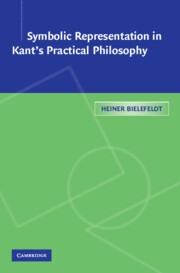Book contents
- Frontmatter
- Contents
- Citations and Translations
- Acknowledgments
- I INTRODUCTION
- II KANT'S SOCRATIC ENLIGHTENMENT
- III THE LAW OF FREEDOM
- IV HOW TO FIND ORIENTATION IN MORAL PRACTICE
- V THE ORDER OF RIGHTS AS A SYMBOL OF HUMAN DIGNITY
- VI TRACES OF PURPOSIVENESS IN NATURE AND HISTORY
- VII SYMBOLISM IN THE PHILOSOPHY OF RELIGION
- VIII CONCLUSION
- Bibliography
- Index
IV - HOW TO FIND ORIENTATION IN MORAL PRACTICE
Published online by Cambridge University Press: 12 July 2009
- Frontmatter
- Contents
- Citations and Translations
- Acknowledgments
- I INTRODUCTION
- II KANT'S SOCRATIC ENLIGHTENMENT
- III THE LAW OF FREEDOM
- IV HOW TO FIND ORIENTATION IN MORAL PRACTICE
- V THE ORDER OF RIGHTS AS A SYMBOL OF HUMAN DIGNITY
- VI TRACES OF PURPOSIVENESS IN NATURE AND HISTORY
- VII SYMBOLISM IN THE PHILOSOPHY OF RELIGION
- VIII CONCLUSION
- Bibliography
- Index
Summary
Moral Self-Legislation through Maxims
The morally unconditioned expresses itself symbolically in that strict lawfulness that also characterizes the law of nature. The latter therefore provides the “type” of the moral law. Just as natural laws cannot be called laws unless they hold universally, so moral lawgiving too aims at something universal. The categorical imperative thus requires moral self-legislation to proceed in accordance with the criterion of universalizability. At the same time, however, it is obvious that moral action occurs under the ever-changing conditions of a particular lifeworld. How do these two aspects of human morality fit together? Is there an unbridgeable gulf between the universal and the particular? Does ethical universalism, at the end of the day, amount to an “abstract ought” that lacks any impact on real human life with its volatility and unpredictability? It was Hegel who leveled this charge of abstractness against Kant's practical philosophy. Hegel's well-known objection is that “in its loneliness, the formal principle of legislation finds neither a content nor a determination.” And he further asserts: “The universal, the non-contradiction, is something empty which neither in the practical nor the theoretical realm becomes reality.”
The starting point for a critical defense of Kantian ethics against this charge of emptiness is the concept of a maxim that Kant uses to mediate between the universalizability requirement on the one hand and the concrete lifeworld on the other. The universalizability requirement of the categorical imperative would in fact remain abstract were it applied immediately to individual actions.
- Type
- Chapter
- Information
- Symbolic Representation in Kant's Practical Philosophy , pp. 68 - 95Publisher: Cambridge University PressPrint publication year: 2003



